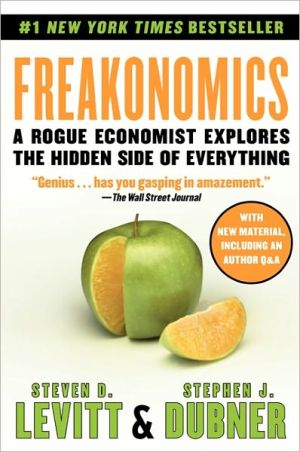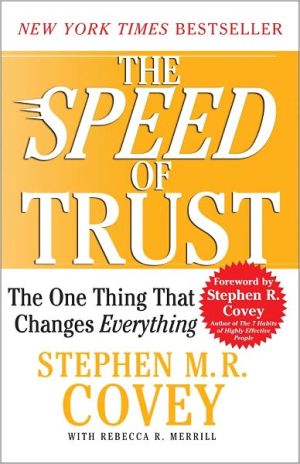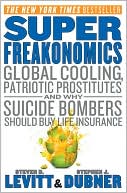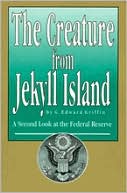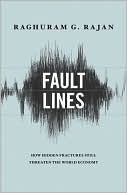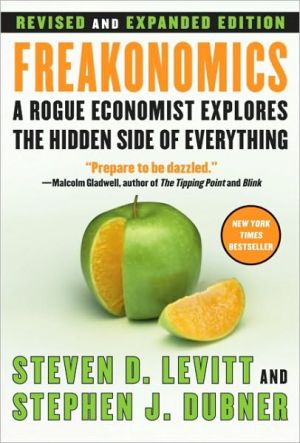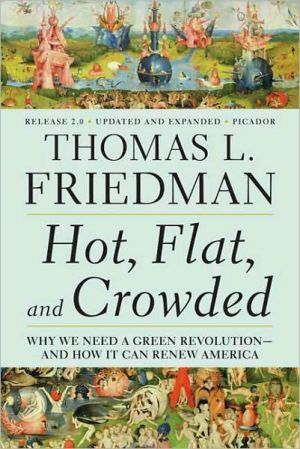Predictably Irrational: The Hidden Forces That Shape Our Decisions
Why do our headaches persist after we take a one-cent aspirin but disappear when we take a fifty-cent aspirin?\ Why do we splurge on a lavish meal but cut coupons to save twenty-five cents on a can of soup?\ When it comes to making decisions in our lives, we think we're making smart, rational choices. But are we?\ In this newly revised and expanded edition of the groundbreaking New York Times bestseller, Dan Ariely refutes the common assumption that we behave in fundamentally rational ways....
Search in google:
A challenging mate to Freakonomics, Predictably Irrational examines how the world often works according to principles of irrationality in the places where we least expect it. Do you know why you still have a headache after taking a one-cent aspirin, but why that same headache disappears if the aspirin costs fifty cents? Do you know why recalling the Ten Commandments reduces people s tendency to lie, or why honor codes are actually effective in reducing dishonesty at the workplace? Do you know why, after doing careful and extensive research on which car to buy, a random meeting with someone who had an awful experience with that car changes your decision? Why do we make decisions contrary to our better judgment? What is better judgment? Predictably Irrational challenges us to ponder these questions (questions we sometimes avoid) and demonstrates how irrationality manifests itself in situations (often very peculiar and hilarious situations) where rational thought is expected. We all succumb to irrationality, it s about time we find out how it affects our daily lives in a significant way. In this astounding new book, groundbreaking in scope and totally original, Dan Ariely cuts to the heart of our strange behaviors and presents outstanding material that will keep every reader transfixed. Predictably Irrational comes from Dr. Ariely s work as a behavioral economist, but it s not for economists. Well, it is, but mainly to the extent that it can help them the same way it can help anyone. If the behaviors that skew our judgments were random or senseless, we d be hard put to sort them out and make better decisions. But research has shown that our irrationality is, in fact, systematic. People will make the same types of mistakes over and over, in a predictable manner, because the behaviors have structural origins. So recognizing them and understanding them offers us a way to do better. And that s the aim of this book: to leave you with new knowledge of human nature, derived from a wide range of scientific experiments and findings, that will help you make better decisions in your personal life, your business life, and in the choices we all need to make about our collective welfare. The Barnes & Noble Review A few years ago, Dan Ariely, an economist at MIT, noted something odd in the subscription rates for the British newsmagazine The Economist. You could take the first option, costing $59, and get a year of full access to their web site. The second, costing $125, would get you a year-long print subscription. And the last, also costing $125, would get you a year of both the print subscription and the online access. Huh?
Predictably Irrational\ The Hidden Forces That Shape Our Decisions \ Chapter One\ The Truth about Relativity\ Why Everything Is Relative—Even When It Shouldn't Be\ One day while browsing the World Wide Web (obviously for work—not just wasting time), I stumbled on the following ad, on the Web site of a magazine, the Economist.\ I read these offers one at a time. The first offer—the Internet subscription for $59—seemed reasonable. The second option—the $125 print subscription—seemed a bit expensive, but still reasonable.\ But then I read the third option: a print and Internet subscription for $125. I read it twice before my eye ran back to the previous options. Who would want to buy the print option alone, I wondered, when both the Internet and the print subscriptions were offered for the same price? Now, the print-only option may have been a typographical error, but I suspect that the clever people at the Economist's London offices (and they are clever—and quite mischievous in a British sort of way) were actually manipulating me. I am pretty certain that they wanted me to skip the Internet-only option (which they assumed would be my choice, since I was reading the advertisement on the Web) and jump to the more expensive option: Internet and print.\ But how could they manipulate me? I suspect it's because the Economist's marketing wizards (and I could just picture them in their school ties and blazers) knew something important about human behavior: humans rarely choose things in absolute terms. We don't have an internal value meter that tells us howmuch things are worth. Rather, we focus on the relative advantage of one thing over another, and estimate value accordingly. (For instance, we don't know how much a six-cylinder car is worth, but we can assume it's more expensive than the four-cylinder model.)\ In the case of the Economist, I may not have known whether the Internet-only subscription at $59 was a better deal than the print-only option at $125. But I certainly knew that the print-and-Internet option for $125 was better than the print-only option at $125. In fact, you could reasonably deduce that in the combination package, the Internet subscription is free! "It's a bloody steal—go for it, governor!" I could almost hear them shout from the riverbanks of the Thames. And I have to admit, if I had been inclined to subscribe I probably would have taken the package deal myself. (Later, when I tested the offer on a large number of participants, the vast majority preferred the Internet-and-print deal.)\ So what was going on here? Let me start with a fundamental observation: most people don't know what they want unless they see it in context. We don't know what kind of racing bike we want—until we see a champ in the Tour de France ratcheting the gears on a particular model. We don't know what kind of speaker system we like—until we hear a set of speakers that sounds better than the previous one. We don't even know what we want to do with our lives—until we find a relative or a friend who is doing just what we think we should be doing. Everything is relative, and that's the point. Like an airplane pilot landing in the dark, we want runway lights on either side of us, guiding us to the place where we can touch down our wheels.\ In the case of the Economist, the decision between the Internet-only and print-only options would take a bit of thinking. Thinking is difficult and sometimes unpleasant. So the Economist's marketers offered us a no-brainer: relative to the print-only option, the print-and-Internet option looks clearly superior.\ The geniuses at the Economist aren't the only ones who understand the importance of relativity. Take Sam, the television salesman. He plays the same general type of trick on us when he decides which televisions to put together on display:\ \ 36-inch Panasonic for $690\ 42-inch Toshiba for $850\ 50-inch Philips for $1,480\ \ Which one would you choose? In this case, Sam knows that customers find it difficult to compute the value of different options. (Who really knows if the Panasonic at $690 is a better deal than the Philips at $1,480?) But Sam also knows that given three choices, most people will take the middle choice (as in landing your plane between the runway lights). So guess which television Sam prices as the middle option? That's right—the one he wants to sell!\ Of course, Sam is not alone in his cleverness. The New York Times ran a story recently about Gregg Rapp, a restaurant consultant, who gets paid to work out the pricing for menus. He knows, for instance, how lamb sold this year as opposed to last year; whether lamb did better paired with squash or with risotto; and whether orders decreased when the price of the main course was hiked from $39 to $41.\ One thing Rapp has learned is that high-priced entrées on the menu boost revenue for the restaurant—even if no one buys them. Why? Because even though people generally won't buy the most expensive dish on the menu, they will order the second most expensive dish. Thus, by creating an expensive dish, a restaurateur can lure customers into ordering the second most expensive choice (which can be cleverly engineered to deliver a higher profit margin).1\ So let's run through the Economist's sleight of hand in slow motion.\ As you recall, the choices were:\ 1. Internet-only subscription for $59.\ 2. Print-only subscription for $125.\ 3. Print-and-Internet subscription for $125.\ When I gave these options to 100 students at MIT's Sloan School of Management, they opted as follows:\ 1. Internet-only subscription for $59—16 students\ 2. Print-only subscription for $125—zero students\ 3. Print-and-Internet subscription for $125—84 students\ Predictably Irrational\ The Hidden Forces That Shape Our Decisions. Copyright © by Dan Ariely. Reprinted by permission of HarperCollins Publishers, Inc. All rights reserved. Available now wherever books are sold.
Introduction How an Injury Led Me to Irrationality and to the Research Described HereCh. 1 The Truth about Relativity: Why Everything Is Relative - Even When It Shouldn't Be 1Ch. 2 The Fallacy of Supply and Demand: Why the Price of Pearls - and Everything Else - Is Up in the Air 23Ch. 3 The Cost of Zero Cost: Why We Often Pay Too Much When We Pay Nothing 49Ch. 4 The Cost of Social Norms: Why We Are Happy to Do Things, but Not When We Are Paid to Do Them 67Ch. 5 The Influence of Arousal: Why Hot Is Much Hotter Than We Realize 89Ch. 6 The Problem of Procrastination and Self-Control: Why We Can't Make Ourselves Do What We Want to Do 109Ch. 7 The High Price of Ownership: Why We Overvalue What We Have 127Ch. 8 Keeping Doors Open: Why Options Distract Us from Our Main Objective 139Ch. 9 The Effect of Expectations: Why the Mind Gets What It Expects 155Ch. 10 The Power of Price: Why a 50-Cent Aspirin Can Do What a Penny Aspirin Can't 173Ch. 11 The Context of Our Character, Part I: Why We Are Dishonest, and What We Can Do about It 195Ch. 12 The Context of Our Character, Part II: Why Dealing with Cash Makes Us More Honest 217Ch. 13 Beer and Free Lunches: What Is Behavioral Economics, and Where Are the Free Lunches? 231Reflections and Anecdotes about Some of the Chapters 245Thoughts about the Subprime Mortgage Crisis and Its Consequences 279Thanks 331List of Collaborators 335Notes 341Bibliography and Additional Readings 345Index 355
\ George Akerlof"PREDICTABLY IRRATIONAL is wildly original. It shows why—much more often than we usually care to admit—humans make foolish, and sometimes disastrous, mistakes. Ariely not only gives us a great read; he also makes us much wiser."\ \ \ \ \ Geoffrey Moore"A delightfully brilliant guide to our irrationality—and how to overcome it—in the marketplace and everyplace."\ \ \ Boston Globe"In creative ways, author Dan Ariely puts rationality to the test. . . . New experiments and optimistic ideas tumble out of him, like water from a fountain."\ \ \ \ \ New York Times Book Review"Sly and lucid. . . . Predictably Irrational is a far more revolutionary book than its unthreatening manner lets on."\ \ \ \ \ USA Today"Surprisingly entertaining. . . . Easy to read. . . . Ariely’s book makes economics and the strange happenings of the human mind fun."\ \ \ \ \ Financial Times"Inventive. . . . An accessible account. . . . Ariely is a more than capable storyteller . . . If only more researchers could write like this, the world would be a better place."\ \ \ \ \ Time magazine“A fascinating romp through the science of decision-making that unmasks the ways that emotions, social norms, expectations, and context lead us astray.”\ \ \ \ \ BusinessWeek"An entertaining tour of the many ways people act against their best interests, drawing on Ariely’s own ingeniously designed experiments. . . . Personal and accessible."\ \ \ \ \ The New Yorker"A taxonomy of financial folly."\ \ \ \ \ Entertainment Weekly"Ariely’s book addresses some weighty issues . . . with an unexpected dash of humor."\ \ \ \ \ Wenda Harris Millard"PREDICTABLY IRRATIONAL is a scientific but imminently readable and decidedly insightful look into why we do what we do every day...and why, even though we ‘know better,’ we may never change."\ \ \ \ \ Jack M Greenberg"Predictably Irrational is an important book. Full of valuable and entertaining insights that will make an impact on your business, professional, and personal life."\ \ \ \ \ Nassim Nicholas Taleb"This is a wonderful, eye-opening book. Deep, readable, and providing refreshing evidence that there are domains and situations in which material incentives work in unexpected ways. We humans are humans, with qualities that can be destroyed by the introduction of economic gains. A must read!"\ \ \ \ \ Jerome Groopman"A marvelous book that is both thought provoking and highly entertaining, ranging from the power of placebos to the pleasures of Pepsi. Ariely unmasks the subtle but powerful tricks that our minds play on us, and shows us how we can prevent being fooled."\ \ \ \ \ James Surowiecki"Dan Ariely is a genius at understanding human behavior: no economist does a better job of uncovering and explaining the hidden reasons for the weird ways we act, in the marketplace and out. PREDICTABLY IRRATIONAL will reshape the way you see the world, and yourself, for good."\ \ \ \ \ Daniel Gilbert"PREDICTABLY IRRATIONAL is a charmer-filled with clever experiments, engaging ideas, and delightful anecdotes. Dan Ariely is a wise and amusing guide to the foibles, errors, and bloopers of everyday decision-making."\ \ \ \ \ Charles Schwab"The most difficult part of investing is managing your emotions. Dan explains why that is so challenging for all of us, and how recognizing your built-in biases can help you avoid common mistakes."\ \ \ \ \ Kenneth Arrow"Dan Ariely’s ingenious experiments explore deeply how our economic behavior is influenced by irrational forces and social norms. In a charmingly informal style that makes it accessible to a wide audience, PREDICTABLY IRRATIONAL provides a standing criticism to the explanatory power of rational egotistic choice."\ \ \ \ \ Nicholas Negroponte"After reading this book, you will understand the decisions you make in an entirely new way."\ \ \ \ \ Paul Slovic"Predictably Irrational is clever, playful,humorous, hard hitting, insightful, and consistently fun and exciting to read."\ \ \ \ \ Chip Heath"Freakonomics held that people respond to incentives, perhaps in undesirable ways, but always rationally. Dan Ariely shows you how people are deeply irrational, and predictably so."\ \ \ \ \ Time Magazine"A fascinating romp through the science of decision-making that unmasks the ways that emotions, social norms, expectations, and context lead us astray."\ \ \ \ \ David Berreby…this sly and lucid book is not about your grandfather's dismal science. Ariely's trade is behavioral economics, which is the study, by experiments, of what people actually do when they buy, sell, change jobs, marry and make other real-life decisions…[Ariely] is good-tempered company—if he mentions you in this book, you are going to be called "brilliant," "fantastic" or "delightful"—and crystal clear about all he describes. But Predictably Irrational is a far more revolutionary book than its unthreatening manner lets on. It's a concise summary of why today's social science increasingly treats the markets-know-best model as a fairy tale.\ —The New York Times\ \ \ \ \ Kirkus ReviewsMost people don't know what they want and don't know that they want it-until they see it and the reptilian brain kicks in. "Everything is relative," writes economist Ariely (Behavioral Economics/MIT), "and that's the point." His book, a cousin to Freakonomics and The Long Tail, is a spry treatise on how the world works and how we spend our money based on other people's rules. Knowing that everything is relative, says Ariely, a merchandiser will display a 19-inch television next to 26-inch and 32-inch models, the prices progressing from $210 to $385 to $580, with the point being to sell the nicely profitable, nicely midsize model first. Of course, because we want more relative to what we have, that merchandiser will hope to see us again, now clamoring for the bigger, more expensive model. Thus the economy chugs along, and thus our credit debt deepens. When the time comes to buy that bigger goodie, then we will respond to an "anchor price" that somehow worms its way into our mind. This is the same anchor price that leads us to think that a four-dollar cup of coffee is acceptable, and after doing it once, we do it again, for we now "assume that this is the way you want to spend your money." Is it? Maybe not, but people are funny creatures of habit, and it is for all of us that Ariely has a brilliant solution to a problem that is very real: "a self-control credit card that would let people restrict their own spending behavior," categorically and overall, fixing, say, grocery spending at $200 a week and coffee spending at $75 a month. Fat chance of it catching on, he allows: After all, the credit-card companies make $17 billion a year in interest charges. They know our irrational ways, too.Make a point of seeing this book. That way you'll know you want it, and you will.\ \ \ \ \ The Barnes & Noble ReviewA few years ago, Dan Ariely, an economist at MIT, noted something odd in the subscription rates for the British newsmagazine The Economist. You could take the first option, costing $59, and get a year of full access to their web site. The second, costing $125, would get you a year-long print subscription. And the last, also costing $125, would get you a year of both the print subscription and the online access. \ Huh?\ The second option, it seems, is a dud. Paying $125 for the magazine or paying $125 for the magazine and the web site isn't so much a choice as a misprint. The latter option should clearly be pricier. Odd for economists to make such an obvious error. At least it would have been, 20 or 30 years ago. But as Ariely explains in Predictably Irrational, that dud option is a feature, not a bug. The bug, rather, is in us.\ For many years, economics operated off the "rational actor" model, often derided as Homo economicus. He was quite a being, this Homo economicus. A perfectly rational consumer, coldly calculating in his purchases, constantly pursuing his self-interest, exquisitely sensitive to the complex information being conveyed through price tags. Think Star Trek's beloved Data, only with a credit card rather than a phaser.\ Much of economics was dedicated to studying this rational actor's rational actions, and rightly so. It turned out that the pursuit of self-interest was a powerful motivator. But in recent years, much in economics has been dedicated to studying where the model breaks down. The emergent movement -- which takes cues from psychology, sociology, anthropology, and even neuroscience -- has been termed behavioral economics, and Ariely is one of its foremost practitioners.\ The nice thing about traditional economics was that you could simply assume rationality. To find out how humans behave, however, requires constructing elaborate tests that allow you to watch their actions as you tweak certain variables. And that's what Ariely excels at. His book is a compendium of these tests, both the ones he and his colleagues have designed and the ones that life has designed for them. So take The Economist's subscription rates. The traditional neoclassical model would suggest that if the magazine wants to offer three subscription levels, they should be priced in accordance with their value. Then we'll get a bunch of rational consumers making rational decisions and buying rationally priced subscriptions and everyone will go home happy.\ But that's not what the Economist subscription department wants. They want to sell a whole lot of copies of their magazine. And so they need to figure out how human beings actually work. "We don't have an internal value meter," writes Ariely, "that tells us how much things are worth. Rather, we focus on the relative advantage of one thing over another, and estimate value accordingly." Staring at those options, we know one thing: The print/web site combo is obviously the best deal. In fact, the online access seems to be...free!\ To test this, Ariely gave 100 of his students at MIT The Economist's subscription options and asked them to choose between them. Sixteen of his students chose the Internet-only option. None of his students chose the print-only option. The remaining 84 chose the combo option.\ Then he asked another 100 students to choose their preferred subscription package. But he eliminated the print-only option. Now they had a straight comparison between $59 for the web site and $125 for the print edition and the web site. If they were rational actors who had accurately assessed the value of the subscription options the first time, the results shouldn't change. After all, the two plans have remained exactly the same price, and the plan that's been removed wasn't chosen by anyone. But when Ariely took away that dummy print rate, the choices shifted dramatically. Now, 68 students chose the online option, while 32 took the combo -- a total reversal of the original preferences.\ Ariely's book goes on much in this vein. Experiment after experiment shows the delicate and unstable edifice on which our rationality rests. He relates an astonishing study in which male college students were asked to answer questions about sexual preferences, then paid money to answer those same questions while masturbating to pornography. The change in emotional state massively transformed the answers. To give two of the more unsettling answers, where 20 percent of the students originally said they would keep trying to have sex after their date said no, 45 percent of the aroused students said they'd keep pressing. And where 23 percent of the non-aroused students said they could imagine being attracted to a 12-year-old, 46 percent of the aroused students said the same. It will not shock too many in the audience to suggest that intense arousal may impede more rational thought. But the implication is significant: It suggests that "we" are not rational. Rather, we're rational at certain times and in certain places, and only then when we're in a certain emotional state.\ Elsewhere, Ariely shows how we wildly overvalue things we think of as free, relating experiments in which individuals demonstrate a preference for paying nothing in order to receive a candy of minimal value rather than paying very little for a truffle they perceived of as high value. Make the low value candy a penny, however, and that preference disappears, even though a penny may as well be free. He also shows how expectations govern experiences, and relates studies in which individuals thought the soda they were consuming tasted much better when they were told, beforehand, that it was Coke or Pepsi. And on, and on. Our decisions are based on context, comparisons, emotional states, remembered advertisements, and a whole lot more that doesn't quite fit the description "rational."\ But Ariely's point goes far beyond our irrationality -- it is the predictability of our processing flaws that interests him. It isn't that we sometimes make the wrong decision, but that we make it repeatedly, and in the same way, as a response to certain conditions and mental processes. Early on in the book, Ariely tells us about Gregg Rapp, a restaurant consultant who helps establishments figure out their menu pricing. "One thing Rapp has learned," writes Ariely, "is that high-priced entrees on the menu boost revenues for the restaurant -- even if no one buys them. Why? Because even though people generally won't buy the most expensive dish on the menu, they will order the second most expensive dish. Thus, by creating an expensive dish, a restaurateur can lure customers into ordering the second most expensive dish (which can be cleverly engineered to deliver a high profit margin)."\ The implication here is that our irrationality is not only predictable, it's actually being predicted. Restaurants know that we anchor our frugality by deciding the priciest item on the menu is too expensive. Electronic stores know that we're likely to go for the marked-down television whose price places it in the middle of the pack. Magazines know we'll go for whichever subscription rate looks like the best deal as compared to the other subscription rates on the page. The problem, then, is not our predictable irrationality, but the world's asymmetric rationality. They know how we're going to screw up, and how to take advantage of it. The only defense is being similarly aware of our flaws and failings, and trying to take into account not only how they affect our judgment, but how they're being used against us. Ariely's book is an excellent place to start. --Ezra Klein\ Ezra Klein is a staff writer at The American Prospect.\ \ \

